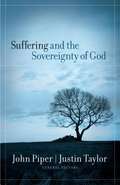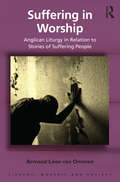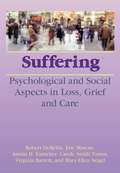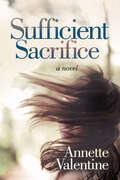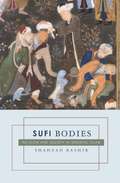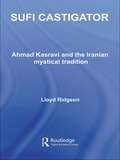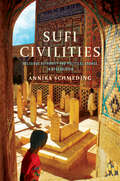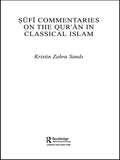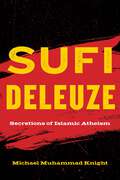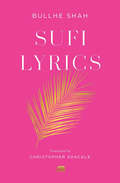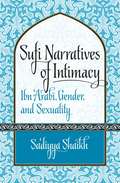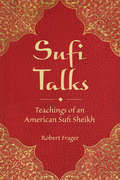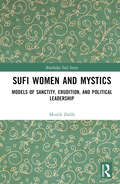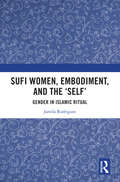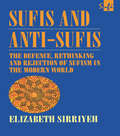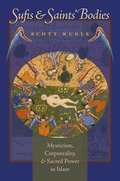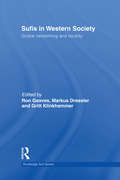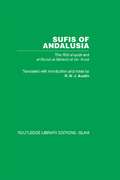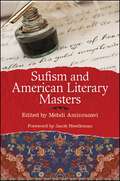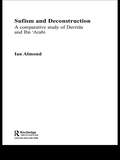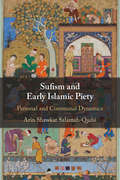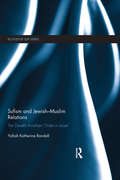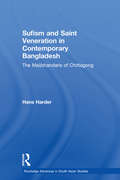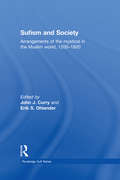- Table View
- List View
Suffering and the Sovereignty of God
by John Piper Justin TaylorIn the last few years, 9/11, a tsunami, Hurricane Katrina, and many other tragedies have shown us that the vision of God in today's churches in relation to evil and suffering is often frivolous. Against the overwhelming weight and seriousness of the Bible, many Christians are choosing to become more shallow, more entertainment-oriented, and therefore irrelevant in the face of massive suffering. In Suffering and the Sovereignty of God, contributors John Piper, Joni Eareckson Tada, Steve Saint, Carl Ellis, David Powlison, Dustin Shramek, and Mark Talbot explore the many categories of God's sovereignty as evidenced in his Word. They urge readers to look to Christ, even in suffering, to find the greatest confidence, deepest comfort, and sweetest fellowship they have ever known.
Suffering in Worship: Anglican Liturgy in Relation to Stories of Suffering People (Liturgy, Worship and Society Series)
by Armand Léon van OmmenHow does the universal experience of suffering relate to the experience of worship? Questioning how Anglican liturgy welcomes people who are suffering, Suffering in Worship uniquely applies a narrative–ritual model for the analysis of both the liturgical text and worship services themselves. In this book, van Ommen draws on interviews with participants in worship as well as clergy. Highlighting several elements in the liturgy which address suffering, including the Eucharist, songs, sermons and prayers of intercession, he shows the significance of a warm and safe liturgical community as a necessary context for suffering people to find consolation. This book also uses the concept of remembrance to plead for liturgy that attends to the suffering of both God and people. As such, it will be of interest to scholars of pastoral theology as well as clergy.
Suffering: Psychological and Social Aspects in Loss, Grief, and Care
by Robert DeBellis, Eric Marcus, Austin H. Kutscher, Carole Smith Torres, Virginia Barrett, and Mary-Ellen SiegelLearn to help others understand, cope with, and even overcome emotional and physical suffering. Suffering: Psychological and Social Aspects in Loss, Grief, and Care is a unique and insightful volume of observations, anecdotes, and case studies about suffering. In this important book, doctors, nurses, teachers, funeral directors, and members of the clergy discuss the crucial physical, emotional, and psychological issues that patients and their families must confront when death is imminent. They address a variety of topics including terminal illness, chronic illness, loss, grief, and pain. Ideal for professionals who work with dying people and their families, Suffering highlights topics that are particularly common when working with AIDS patients, cancer patients, children, the elderly, and the mentally ill.
Sufficient Sacrifice: A Novel
by Annette ValentineA father struggles to raise his daughter right as she comes of age in the 1960s in this moving conclusion to a multi-generational family trilogy.Simon Hagan’s life has been portrayed over several decades in Annette Valentine’s novels Eastbound From Flagstaff and Down to the Potter’s House. In Sufficient Sacrifice, he bears the burden of responsibility to give his child, Alexandra, the foundational strength she needs to navigate the bumpy road of her youthful years and the proverbial wings she needs to fly against the winds of young adulthood.With the goal of Sufficient Sacrifice elevating the power of a father’s love for his child, the story poses the question of whether Simon’s influence has diminished over time or been compromised by the eroding push of a determined woman. Simon, however, makes the necessary sacrifices. Having given all he had to give, Sufficient Sacrifice uniquely portrays his stunning and triumphant victory over Alexandra’s confusion and rebellion. The results land her on higher ground, enabling her to be more than conqueror.“Excellent!! An absolute treasure that recounts the warm and sometimes harsh realities of a family striving to maintain a high standard of living amidst currents of mediocrity.” —Becky Hadden Wise, educator, Carver Middle School, Spartanburg, South Carolina
Sufi Bodies: Religion and Society in Medieval Islam
by Shahzad BashirBetween 1300 and 1500 C.E. a new form of Sufi Islam took hold among central Islamic peoples, joining individuals through widespread networks resembling today's prominent paths and orders. Understanding contemporary Sufism requires a sophisticated analysis of these formative years. Moving beyond a straight account of leaders and movements, Shahzad Bashir weaves a rich history around the depiction of bodily actions by Sufi masters and disciples, primarily in Sufi literature and Persian miniature paintings of the period.Focusing on the Persianate societies of Iran and Central Asia, Bashir explores medieval Sufis' conception of the human body as the primary shuttle between interior (batin) and exterior (zahir) realities. Drawing on literary, historical, and anthropological approaches to corporeality, he studies representations of Sufi bodies in three personal and communal arenas: religious activity in the form of ritual, asceticism, rules of etiquette, and a universal hierarchy of saints; the deep imprint of Persian poetic paradigms on the articulation of love, desire, and gender; and the reputation of Sufi masters for working miracles, which empowered them in all domains of social activity. Bashir's novel perspective illuminates complex relationships between body and soul, body and gender, body and society, and body and cosmos. It highlights love as an overarching, powerful emotion in the making of Sufi communities and situates the body as a critical concern in Sufi thought and practice. Bashir's work ultimately offers a new methodology for extracting historical information from religious narratives, especially those depicting extraordinary and miraculous events.
Sufi Castigator: Ahmad Kasravi and the Iranian Mystical Tradition (Routledge Sufi Series #Vol. 19)
by Lloyd RidgeonSufi Castigator investigates the writings of Ahmad Kasravi, one of the foremost intellectuals in Iran. It studies his work within the context of Sufism in modern Iran and mystical Persian literature and includes translations of Kasravi’s writings. Kasravi provides a fascinating topic for those with interests in Sufism and Iranian studies as he attempted to produce a form of Iranian identity that he believed was compatible with the modern age and Iranian nationalism. His stress on reason and the de-mystification of religion caused him to repudiate Sufism and much of the Sufi literary heritage as backwards and believed it a reason for the weakness of modern Iran. Kasravi’s historical observations were weak, and his writings indicate that he was working towards pre-determined conclusions. However, his works are of significance because they contributed to a major discussion in the 1930s to 1940s about the ideal image and identity that Iranians should adopt. Despite the academic weaknesses of Kasravi’s works he had a profound effect on the next generation of thinkers. Sufi Castigator is stimulating and meticulously researched book and includes two lengthy translations of Kasravi’s works, Sufism and What does Hafez Say? and will appeal to scholars of middle eastern studies.
Sufi Civilities: Religious Authority and Political Change in Afghanistan
by Annika SchmedingDespite its pervasive reputation as a place of religious extremes and war, Afghanistan has a complex and varied religious landscape where elements from a broad spectrum of religious belief vie for a place in society. It is also one of the birthplaces of a widely practiced variant of Islam: Sufism. Contemporary analysts suggest that Sufism is on the decline due to war and the ideological hardening that results from societies in conflict. However, in Sufi Civilities, Annika Schmeding argues that this is far from a truthful depiction. Members of Sufi communities have worked as resistance fighters, aid workers, business people, actors, professors, and daily workers in creative and ingenious ways to keep and renew their networks of community support. Based on long-term ethnographic field research among multiple Sufi communities in different urban areas of Afghanistan, the book examines navigational strategies employed by Sufi leaders over the past four decades to weather periods of instability and persecution, showing how they adapted to changing conditions in novel ways that crafted Sufism as a force in the civil sphere. This book offers a rare on-the-ground view into how Sufi leaders react to moments of transition within a highly insecure environment, and how humanity shines through the darkness during times of turmoil.
Sufi Commentaries on the Qur'an in Classical Islam (Routledge Studies in the Qur'an)
by Kristin SandsMeeting the ever increasing interest in Islam and Sufism, this book is the first comprehensive study of Sufi Qur’anic commentaries and includes translations of many writings previously unavailable in English. It examines the shared hermeneutical assumptions of Sufi writers and the diversity in style of Sufi commentaries. Some of the assumptions analyzed are: * the Qur’an is a multi-layered and ambiguous text open to endless interpretation * the knowledge of deeper meanings of the Qur’an is attainable by means other than transmitted interpretations and rational thought * the self is dynamic, moving through states and stations which result in different interpretations at different times. The styles of Sufi commentaries are explored, which range from philosophical musings to popular preaching to literary narrative and poetry. Other commentaries from the classical period are also investigated to provide context in understanding Sufi approaches and exegetical styles.
Sufi Deleuze: Secretions of Islamic Atheism
by Michael Muhammad Knight“There is always an atheism to be extracted from a religion,” Deleuze and Guattari write in their final collaboration, What Is Philosophy? Their claim that Christianity “secretes” atheism “more than any other religion,” however, reflects the limits of their archive. Theological projects seeking to engage Deleuze remain embedded within Christian theologies and intellectual histories; whether they embrace, resist, or negotiate with Deleuze’s atheism, the atheism in question remains one extracted from Christian theology, a Christian atheism. In Sufi Deleuze, Michael Muhammad Knight offers an intervention, engaging Deleuzian questions and themes from within Islamic tradition. Even if Deleuze did not think of himself as a theologian, Knight argues, to place Deleuze in conversation with Islam is a project of comparative theology and faces the challenge of any comparative theology: It seemingly demands that complex, internally diverse traditions can speak as coherent, monolithic wholes. To start from such a place would not only defy Islam’s historical multiplicity but also betray Deleuze’s model of the assemblage, which requires attention to not only the organizing and stabilizing tendencies within a structure but also the points at which a structure resists organization, its internal heterogeneity, and unpredictable “lines of flight.”A Deleuzian approach to Islamic theology would first have to affirm that there is no such thing as a universal “Islamic theology” that can speak for all Muslims in all historical settings, but rather a multiplicity of power struggles between major and minor forces that contest each other over authenticity, authority, and the making of “orthodoxy.” The discussions in Sufi Deleuze thus highlight Islam’s extraordinary range of possibilities, not only making use of canonically privileged materials such as the Qur’an and major hadith collections, but also exploring a variety of marginalized resources found throughout Islam that challenge the notion of a singular “mainstream” interpretive tradition. To say it in Deleuze’s vocabulary, Islam is a rhizome.
Sufi Lyrics: Selections from a World Classic (Murty Classical Library Of India - Hup Ser. #1)
by Bullhe ShahBullhe Shah’s work is among the glories of Panjabi literature, and the iconic eighteenth-century poet is widely regarded as a master of mystical Sufi poetry. His verses, famous for their vivid style and outspoken denunciation of artificial religious divisions, have long been beloved and continue to win audiences around the world. This striking new translation is the most authoritative and engaging introduction to an enduring South Asian classic.
Sufi Narratives of Intimacy
by Sa'Diyya ShaikhThirteenth-century Sufi poet, mystic, and legal scholar Muhyi al-Din ibn al-'Arabi gave deep and sustained attention to gender as integral to questions of human existence and moral personhood. Reading his works through a critical feminist lens, Sa'diyya Shaikh opens fertile spaces in which new and creative encounters with gender justice in Islam can take place. Grounding her work in Islamic epistemology, Shaikh attends to the ways in which Sufi metaphysics and theology might allow for fundamental shifts in Islamic gender ethics and legal formulations, addressing wide-ranging contemporary challenges including questions of women's rights in marriage and divorce, the politics of veiling, and women's leadership of ritual prayer. Shaikh deftly deconstructs traditional binaries between the spiritual and the political, private conceptions of spiritual development and public notions of social justice, and the realms of inner refinement and those of communal virtue. Drawing on the treasured works of Sufism, Shaikh raises a number of critical questions about the nature of selfhood, subjectivity, spirituality, and society to contribute richly to the prospects of Islamic feminism as well as feminist ethics more broadly.
Sufi Talks
by Robert FragerOnce a woman brought her son to the thirteenth-century Turkish Sufi master Nasruddin complaining that the boy had an uncontrollable sweet tooth. She asked Nasruddin to tell the boy to stop eating sweets. He said to bring him back in four weeks. When they returned he said, "Boy, I order you to stop eating sweets!" The mother asked, "Couldn't you have said that at the beginning? Why make us wait four weeks?" "No, I couldn't have said that even two weeks ago," Nasruddin replied. "Why not?" asked the mother. "Because I love sweets myself. First I had to control my own love for them. Only then could I tell your son to stop eating them."That is, words are empty unless backed by experience, says Robert Frager. People will not change until they hear from those who have lived what they teach. Frager has indeed lived his teaching. Founder of the Institute for Transpersonal Psychology in 1975, in 1976 he became a student of the Sufi master Muzaffer Efendi. Since becoming a sheikh in 1985, he has given many sohbets-a Turkish word for the spiritual conversations Sufi teachers hold to inspire their students. The sohbets he presents here are compiled from his talks over the past decade and represent Sufism as it is now practiced in the United States.Frager believes that the wisdom in such talks flows through the sheikh from his teacher and his teacher's teacher all the way back to the Prophet Mohammad and God; the sheikh is merely a channel for something greater than any individual. Moreover, these talks are not lectures but rather living connections going both ways between heart and heart. Indeed, the warm, personal immediacy to Frager's voice is rarely found. Like the tales of Nasruddin, he teaches through colorful anecdote and metaphors. Sufi practice has two sides, he says: one is to develop our love of God; the other is to become less self-centered. We need both, just as a bird needs both wings to fly. "How can I put my knowledge into practice?" is the question we must ask. As the Qur'an states, those who fail to live by their understanding are like donkeys carrying a load of books. The books won't change them. They can carry the holiest books but will still be donkeys.Among the practices Frager teaches are zikr, or remembrance of God through chanting; halvet, or spiritual retreat; and adab, or "right action." Thus do we develop character-or, rather, restore the character we had at birth. "I've never seen a baby with a bad character," he says. "We are all born in a pure state. With hard work and God's blessings we can return to it." Other topics include Obstacles on the Path, Reducing Narcissism, Inner Work, Prayer, Marriage, Generosity, Taking Responsibility, and Waking before We Die.No matter what one's religion, the reader will find such universal wisdom in this book that he will agree with Frager's teacher Muzaffer Efendi who once advised, "You can tell these stories ten thousand times and people will still benefit from them."
Sufi Talks
by Robert FragerOnce a woman brought her son to the thirteenth-century Turkish Sufi master Nasruddin complaining that the boy had an uncontrollable sweet tooth. She asked Nasruddin to tell the boy to stop eating sweets. He said to bring him back in four weeks. When they returned he said, "Boy, I order you to stop eating sweets!" The mother asked, "Couldn't you have said that at the beginning? Why make us wait four weeks?" "No, I couldn't have said that even two weeks ago," Nasruddin replied. "Why not?" asked the mother. "Because I love sweets myself. First I had to control my own love for them. Only then could I tell your son to stop eating them."That is, words are empty unless backed by experience, says Robert Frager. People will not change until they hear from those who have lived what they teach. Frager has indeed lived his teaching. Founder of the Institute for Transpersonal Psychology in 1975, in 1976 he became a student of the Sufi master Muzaffer Efendi. Since becoming a sheikh in 1985, he has given many sohbets-a Turkish word for the spiritual conversations Sufi teachers hold to inspire their students. The sohbets he presents here are compiled from his talks over the past decade and represent Sufism as it is now practiced in the United States.Frager believes that the wisdom in such talks flows through the sheikh from his teacher and his teacher's teacher all the way back to the Prophet Mohammad and God; the sheikh is merely a channel for something greater than any individual. Moreover, these talks are not lectures but rather living connections going both ways between heart and heart. Indeed, the warm, personal immediacy to Frager's voice is rarely found. Like the tales of Nasruddin, he teaches through colorful anecdote and metaphors. Sufi practice has two sides, he says: one is to develop our love of God; the other is to become less self-centered. We need both, just as a bird needs both wings to fly."How can I put my knowledge into practice?" is the question we must ask. As the Qur'an states, those who fail to live by their understanding are like donkeys carrying a load of books. The books won't change them. They can carry the holiest books but will still be donkeys.Among the practices Frager teaches are zikr, or remembrance of God through chanting; halvet, or spiritual retreat; and adab, or "right action." Thus do we develop character-or, rather, restore the character we had at birth. "I've never seen a baby with a bad character," he says. "We are all born in a pure state. With hard work and God's blessings we can return to it." Other topics include Obstacles on the Path, Reducing Narcissism, Inner Work, Prayer, Marriage, Generosity, Taking Responsibility, and Waking before We Die.No matter what one's religion, the reader will find such universal wisdom in this book that he will agree with Frager's teacher Muzaffer Efendi who once advised, "You can tell these stories ten thousand times and people will still benefit from them"
Sufi Women and Mystics: Models of Sanctity, Erudition, and Political Leadership (Routledge Sufi Series)
by Minlib DallhThis book focuses on women’s important contribution to Sufism by analysing the lives and seminal contributions of six mystic Sufi women to Islamic spirituality. To help reverse the sidelining of Sufi women in the recorded academic literature, the author has selected a representative sample of figures from diverse Islamic dynasties with varying backgrounds, social status, and devotional contributions. Taking a historical approach attentive to specific political contexts, readers will be introduced to the contributions of Umm Ali al-Balkhi and Fātima of Nishāpūr in the ninth-century Khurāsān, Aisha al-Mannūbiyya of the Hafsid dynasty in Afriqya, Aisha al-Bā‘únīyya of the Mamlūk dynasties of Egypt and Syria, the Mughal princess Jahan Ara Begum, and the daughter of the Caliph of Sokoto, Nana Asma’u. It is argued that these ascetic and Sufi women were recognized by their male and female peers, became political leaders in their communities, and were honored as examples of sanctity and erudition. Their works influenced mystical discourse, hagiographical writings, religious language and models of religious authority to secure legacies of Islamic orthopraxis. The book will appeal to anyone interested in Sufism and Sufi history, as well as to those wishing to delve into the understudied topic of Muslim women’s spirituality.
Sufi Women, Embodiment, and the ‘Self’: Gender in Islamic Ritual
by Jamila RodriguesThis book is an ethnographic case study of Sufi ritual practice and embodied experience amongst female members of the Naqshbandi community. Drawing on fieldwork in Cape Town, South Africa, and Lefke, Cyprus (2013/2014), the author examines women’s experiences within a particular performance of Sufi tradition. The focus is on the ritual named hadra, involving the recital of sacred texts, music, and body movement, where the goal is for the individual to reach a state of intimacy with God. The volume considers Sufi practice as a form of embodied cultural behavior, religious identity, and selfhood construction. It explains how Muslim women’s participation in hadra ritual life reflects religious and cultural ideas about the body, the body’s movement, and embodied selfhood expression within the ritual experience. Sufi Women, Ritual Embodiment and the ‘Self’ engages with studies in Sufism, symbolic anthropology, ethnography, dance, and somatic studies. Contributing to discussions of religion, gender, and the body, the book will be of interest to scholars from anthropology, sociology, religious ritual studies, Sufism and gender studies, and performance studies.
Sufis and Anti-Sufis: The Defence, Rethinking and Rejection of Sufism in the Modern World (Routledge Sufi Series)
by Elizabeth SirriyehDespite its continuing appeal in the Muslim world, Sufism has faced fierce challenges in the last 250 years. This volume assesses the evolution of anti-Sufism since the middle of the eighteenth century and Sufi strategies for survival. It also considers the efforts of a few significant Muslim intellectuals to contemplate a future for a mystical approach to Islam without traditional Sufism. Many studies of Islam in the modern period have focused on the attempts of Muslim 'modernists' or 'fundamentalists' to come to terms with western modernity, and Sufis have often been marginalised in the process. Elizabeth Sirriyeh redresses this neglect by assigning to Sufism a central place in the broader history of Islam in the modern world and by examining how changing understandings of Sufism's role in modern conditions have affected Muslims of all shades of opinion.
Sufis and Saints' Bodies
by Scott KugleIslam is often described as abstract, ascetic, and uniquely disengaged from the human body. Scott Kugle refutes this assertion in the first full study of Islamic mysticism as it relates to the human body. Examining Sufi conceptions of the body in religious writings from the late fifteenth through the nineteenth century, Kugle demonstrates that literature from this era often treated saints' physical bodies as sites of sacred power.Sufis and Saints' Bodies focuses on six important saints from Sufi communities in North Africa and South Asia. Kugle singles out a specific part of the body to which each saint is frequently associated in religious literature. The saints' bodies, Kugle argues, are treated as symbolic resources for generating religious meaning, communal solidarity, and the experience of sacred power. In each chapter, Kugle also features a particular theoretical problem, drawing methodologically from religious studies, anthropology, studies of gender and sexuality, theology, feminism, and philosophy. Bringing a new perspective to Islamic studies, Kugle shows how an important Islamic tradition integrated myriad understandings of the body in its nurturing role in the material, social, and spiritual realms.
Sufis in Western Society: Global networking and locality (Routledge Sufi Series)
by Ron Geaves Markus Dressler Gritt KlinkhammerIn recent years Sufism has undergone something of a revival as a spiritual alternative to other manifestations of Islam. This book investigates the development of Sufism in Western societies, with a regional focus on North America and Europe. Exploring a number of issues relating to the dynamic tensions between religious globalization processes and specific sacred localities, this book looks at the formation of Sufi movements that have migrated from their place of origin to become global religious networks. Sufi groups are highly differentiated and often inaccessible, so the origins and development of Sufism in the West have not been widely studied. Employing a comparative approach based on regional fieldwork and case studies, this book addresses theoretical issues and gives a comprehensive analysis of distinct communities and the development of regional branches of Sufi orders, providing an international perspective on Sufism in the West. With contributions from well-known international experts on the topic, the book addresses Sufi orders in the context of the transnational networks in which they are operating and the constraints of the localities in which they live. This book will be of interest to scholars and students of religion, Islam and Sufism in particular.
Sufis of Andalucia: The Ruh al-Quds and Al-Durat Fakhirah (Routledge Library Editions: Islam)
by M. Ibn 'ArabiSufis of Andalusia consists of biographical sketches of some of the contemplatives and spiritual masters among whom Ibn 'Arabi spent his early years.
Sufism and American Literary Masters (SUNY series in Islam)
by Mehdi Aminrazavi; Jacob NeedlemanThis book reveals the rich, but generally unknown, influence of Sufism on nineteenth- and early twentieth-century American literature. The translation of Persian poets such as Hafiz and Sa'di into English and the ongoing popularity of Omar Khayyam offered intriguing new spiritual perspectives to some of the major American literary figures. As editor Mehdi Aminrazavi notes, these Sufi influences have often been subsumed into a notion of "Eastern," chiefly Indian, thought and not acknowledged as having Islamic roots. This work pays considerable attention to two giants of American literature, Ralph Waldo Emerson and Walt Whitman, who found much inspiration from the Sufi ideas they encountered. Other canonical figures are also discussed, including Mark Twain, Herman Melville, Henry David Thoreau, and Henry Wadsworth Longfellow, along with literary contemporaries who are lesser known today, such as Paschal Beverly Randolph, Thomas Lake Harris, and Lawrence Oliphant.
Sufism and Deconstruction: A Comparative Study of Derrida and Ibn 'Arabi (Routledge Studies in Religion #Vol. 6)
by Ian AlmondExaminung a series of common features in the works of Derrida and the Sufism of Ibn 'Arabi, considered to be one of the most influential figures in Islamic thought, the author addresses the significant absence of attention on the relationship between Islam and Derrida. Presenting a deconstructive perspective on Ibn 'Arabi, the book's features include:* the opposition to systematizing representations of God/reality/the text * a re-emphasis on the radical unthinkability of God and the text * a common conception of rational thought as restrictive, commodifying and ultimately illusory - and a subsequent appraisal of confusion as leading to a higher state of knowledge* a positive belief in the infinate interpretability of the text * a suspicion of represention - and an awareness of its semantic futility, along with a common, 'welcoming' affirmation of openness and errancy towards God and the text.This book will be essential reading for advanced students and academics of Religious studies, Arabic and Islamic studies and those interested in the work of Derrida and Ibn 'Arabi.
Sufism and Early Islamic Piety: Personal and Communal Dynamics
by Arin Salamah-QudsiSufism and Early Islamic Piety: Personal and Communal Dynamics offers a new story about the formative period of Sufism. Through a fresh reading of diverse Sufi and non-Sufi sources, Arin Salamah-Qudsi reveals the complexity of personal and communal aspects of Sufi piety in the period between the ninth and thirteenth centuries. Her study also sheds light on the interrelationships and conflicts of early Sufis through emphasising that early Sufism was neither a quietist or a completely individual mode of piety. Salamah-Qudsi reveals how the early Sufis' commitment to the Islamic ideal of family life lead to different creative arrangements among them in order to avoid contradictions with this ideal and the mystical ideal of solitary life. Her book enables a deeper understanding of the development of Sufism in light of the human concerns and motivations of its founders.
Sufism and Jewish-Muslim Relations: The Derekh Avraham Order in Israel (Routledge Sufi Series)
by Yafia Katherine RandallIn Israel there are Jews and Muslims who practice Sufism together. The Sufi’ activities that they take part in together create pathways of engagement between two faith traditions in a geographical area beset by conflict. Sufism and Jewish Muslim Relations investigates this practice of Sufism among Jews and Muslims in Israel and examines their potential to contribute to peace in the area. It is an original approach to the study of reconciliation, situating the activities of groups that are not explicitly acting for peace within the wider context of grass-roots peace initiatives. The author conducted in-depth interviews with those practicing Sufism in Israel, and these are both collected in an appendix and used throughout the work to analyse the approaches of individuals to Sufism and the challenges they face. It finds that participants understand encounters between Muslim and Jewish mystics in the medieval Middle East as a common heritage to Jews and Muslims practising Sufism together today, and it explores how those of different faiths see no dissonance in the adoption of Sufi practices to pursue a path of spiritual progression. The first examination of the Derekh Avraham Jewish-Sūfī Order, this is a valuable resource for students and scholars of Sufi studies, as well as those interested in Jewish-Muslim relations.
Sufism and Saint Veneration in Contemporary Bangladesh: The Maijbhandaris of Chittagong (Routledge Advances in South Asian Studies)
by Hans HarderFocusing on the Maijbhandari movement in Chittagong, south-eastern Bangladesh, which claims the status of the only Sufi order originated in Bengal and which has gained immense popularity in recent years, this book provides a comprehensive picture of an important aspect of contemporary Bengali Islam in the South Asian context. Expertise in South Asian languages and literatures is combined with ethnographic field work and theoretical formulations from a range of disciplines, including cultural anthropology, Islamic studies and religious studies. Analysing the Maijbhandaris tradition of Bengali spiritual songs, one of the largest popular song traditions in Bengal, the book presents an in-depth study of Bengali Sufi theology, hagiography and Maijbhandari esoteric songs, as well as a discussion of what Bengali Islam is. It is a useful contribution to South Asia Studies, as well as Islamic Studies.
Sufism and Society: Arrangements of the Mystical in the Muslim World, 1200–1800 (Routledge Sufi Series)
by John J. Curry Erik S. OhlanderIn recent years, many historians of Islamic mysticism have been grappling in sophisticated ways with the difficulties of essentialism. Reconceptualising the study of Islamic mysticism during an under-researched period of its history, this book examines the relationship between Sufism and society in the Muslim world, from the fall of the Abbasid caliphate to the heyday of the great Ottoman, Mughal and Safavid empires. Treating a heretofore under-researched period in the history of Sufism, this work establishes previously unimagined trajectories for the study of mystical movements as social actors of real historical consequence. Thematically organized, the book includes case studies drawn from the Middle Eastern, Turkic, Persian and South Asian regions by a group of scholars whose collective expertise ranges widely across different historical, geographical, and linguistic landscapes. Chapters theorise why, how, and to what ends we might reconceptualise some of the basic methodologies, assumptions, categories of thought, and interpretative paradigms which have heretofore shaped treatments of Islamic mysticism and its role in the social, cultural and political history of pre-modern Muslim societies. Proposing novel and revisionist treatments of the subject based on the examination of many under-utilized sources, the book draws on a number of disciplinary perspectives and methodological approaches, from art history to religious studies. As such, it will appeal to students and scholars of Middle East studies, religious history, Islamic studies and Sufism.
